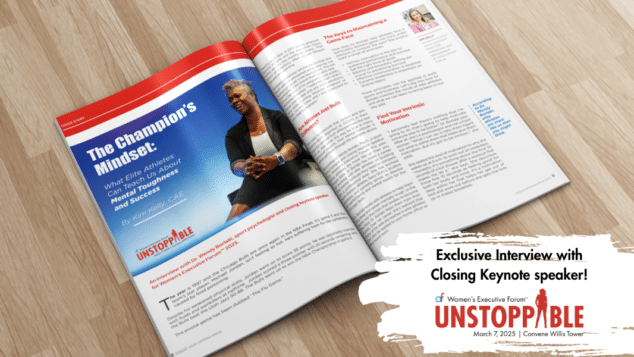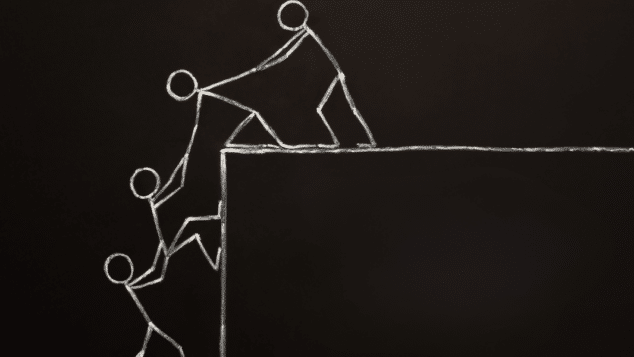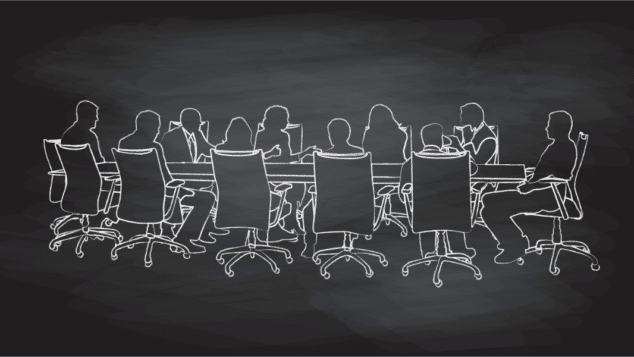It’s Time to Thrive

Corporate and association leaders will never forget when a global pandemic shut down businesses with great uncertainty about reopening. Many associations brought together leadership teams to contact host sites and vendors and renegotiate contracts, frequently canceling live events entirely. Others quickly adopted new technology to host virtual events or work with sponsors to identify creative solutions to reach and communicate with members.
Chicago Innovation was no stranger to 2020’s challenges: The association hosts — and relies on — events year-round for people to share ideas, find opportunities and build relationships with innovators in and around Chicago. And, to be sure, most associations in general rely on these sorts of meetings to generate revenue. The top two revenue streams for associations are membership dues (44%) and events (33%), according to a survey conducted by market research firm Researchscape and CS-Effect. Nearly three out of four associations named exhibiting at a conference as the primary sponsor benefit.
Given the pandemic’s effect on the organization’s business model, Chicago Innovation had no choice but to, well, innovate. Their business transitioned from solely hosting live events to producing virtual events while increasing event registrants, strengthening relationships with sponsors and even gaining new sponsors.
How It Unfolded
Early last year, Illinois Gov. J.B. Pritzker made the announcement that all schools and large events were banned due to COVID-19. The Sport of Innovation, one of Chicago Innovation’s largest events with 600 attendees, was supposed to kick off just three days later.
“We canceled the event, and everyone was understanding, including the site vendor and caterer who gave us a full refund,” says Luke Tanen, executive director, Chicago Innovation. “In early April, we didn’t know when things would return to normal, so we planned to reschedule and thought that by June we would be doing in-person events again.”
In mid-April, the team realized COVID-19’s impact would be more serious, with live events canceled indefinitely. Chicago Innovation leaders came together to quickly plan and schedule virtual events, identifying timely topics that would resonate with its audience and help them through this difficult time.
Chicago Innovation had also originally planned to host the Chicago Student Invention Convention (CSIC) in April with more than 1,000 students and educators. Chicago Innovation leaders pivoted to an all-virtual event and secured more than 100 people as judges. Encyclopedia Britannica, a sponsor of the in-person event, had a program called LumieLabs that allowed for the substitution of traditional trifold display boards that students used to share their inventions. When the entire CSIC program transitioned to a virtual event, videos became an essential component for students to communicate their inventions with judges.
“The CSIC team has been a great partner, and we felt a kinetic synergy between our teams right from the start,” says Sal DeSpirito, senior vice president of marketing and business development, Britannica Group. “It was an absolute pleasure to partner together and help shape this competition to accommodate the current environment.”
The partnership proved more than successful. Ultimately, Chicago Innovation had over 1,600 people watch the virtual CSIC — 600 more people than the traditional in-person event, Tanen says.
A New Value Proposition
Before the pandemic, Chicago Innovation had never hosted a virtual event.
For the first virtual event, the Chicago Innovation team chose a timely topic: Innovation Is Survival. The event focused on how organizations need to embrace innovation more than ever — not just to compete, but to stay in business. Approximately 350 people registered, which was slightly more than projected for an in-person event.
Other topics included how to lead during a crisis as well as helping companies navigate the Paycheck Protection Program, which featured Ed Wehmer, founder of Wintrust Bank.
“We chose topics for the virtual events that people needed to hear about right now,” Tanen says. “We are all writing this playbook together and learning together.”
Another key virtual event element was ensuring a high degree of audience engagement and interactivity. Chicago Innovation created events where the audience could ask questions and interact, including incorporating polling so the panelists could react to the sentiments of the audience. All events were put together within three weeks and hosted via Zoom.
By hosting these virtual events, the association was able to offer two events per month rather than the typical one event a month. Tanen says that prior to the pandemic, Chicago Innovation would have never operated at this speed given that in-person events take a lot more time to secure a host site, caterer, vendors and speakers.
The Sponsor Pitch
Chicago Innovation’s success is highly dependent upon its relationship with sponsors, so leaders were quick to communicate to all sponsors and reassure them that Chicago Innovation was continuing forward, just changing the method. There were three keys to success in maintaining and increasing sponsorships during this time, Tanen says.
First, the organization’s mission and programs remained the same. Second, Chicago Innovation leaders reassured sponsors that events would continue to attract large crowds and that sponsors would have the opportunity to showcase services and products to the Chicago Innovation community. Virtual events also provided a platform to reach an even larger audience.
“We can reach more people because it’s easier to get people who are in the suburbs and in other cities to tune in,” Tanen says. “When we return to normal, we will offer both in-person and virtual events.”
Lastly, and the biggest challenge, was creating an environment for networking, which is a top priority to Chicago Innovation members. “It’s not the same as an in-person cocktail reception, but we now host networking sessions via virtual break rooms, and we share the guest list and LinkedIn profiles before and after the events,” Tanen says. “It’s worked. We’ve had nine sponsorship conversations and all have returned. The value proposition is still high, and they know we will do everything we can to meet their needs.”
Another key takeaway is that the success of a sponsored partnership is highly dependent upon the relationship. “A lot comes down to the relationship we had going into this,” Tanen says. “We have always focused on relationship building with sponsors and partners. Not just meeting them once a year, but always checking in with them and seeing what we can do to help. This enabled us to become partners with them. That foundation was already there.”
Wintrust Bank has been a sponsor of Chicago Innovation since 2013 and is part of a larger element of branding that focuses on small business and economic development. Wintrust saw the impact of the virtual events and approached Chicago Innovation to be its technology partner. Despite the pandemic, the financial institution decided to increase its investment with Chicago Innovation by 25%. “We support organizations that help people start new business, especially during challenging times,” says Matthew Doubleday, chief marketing officer, Wintrust. “Chicago Innovation was one of the first to pivot to virtual events and do it well, keeping the audience engaged.”
“It is a clever example of how a typical relationship with a sponsor can be transformed,” Tanen says. “If there is a lesson to be learned, it is to understand that sponsors have new needs that are totally different than in the past, and you may be able to add value in new ways that you didn’t before.”
In addition to strengthening relationships with existing sponsors, Chicago Innovation secured new sponsors during the pandemic, including Walgreens — now one of the organization’s largest sponsors — and Molex, a manufacturer of electronic, electrical and fiber optic connectivity systems.
The 2021 Push
As association executives look to the future, 49% indicate they feel neutral, according to the Researchscape and CS-Effect survey.
“One of the biggest barriers to innovation is uncertainty about the future,” Tanen says. “For my team, we realized the rules have radically changed overnight, and we have to now operate in this new set of norms. The quicker we accepted it, our innovation took off.”
With the future unknown, it’s best to begin strategizing with your sponsors and plan for both in-person and virtual events. “This year, whether virtual or in person, we will be ready for all of it,” Tanen says. 
![]() Click here for additional recordings on virtual events.
Click here for additional recordings on virtual events.
Chicago Innovation relies heavily on its annual fundraiser — the In-Gala — an in-person event that typically raises $250,000. When the pandemic hit, the Chicago Innovation board decided the fundraiser would have to be virtual. “We hosted the In-Gala because we are all in this together,” says Luke Tanen, executive director, Chicago Innovation. “It was one of the most significant things we did this year — the best event Chicago Innovation turned to Frost, an event production company and longtime partner, to produce a creative, dynamic event that engaged the audience and raised money. During this time, Frost had made its own pivot from doing all in-person events to producing interactive virtual events for clients, including a drive-in theater at Soldier Field and a gala for Steppenwolf. The event production company built a 3,000-square-foot television studio to produce segments of the event, which took the pressure off people. “We continued to do a few live events, including live giveaways,” says Taylor Podgorny, an account executive for Frost. For those segments produced in the studio, Frost sticks to strict COVID-19 guidelines including social distancing, wearing masks and taking temperatures of the people who are being videotaped. Chicago Innovation ensured the event was highly interactive by giving out prizes to winners of a trivia contest. They also hosted a live auction and had a handful of celebrities make appearances, including actor Jeremy Piven, former professional baseball and football player Bo Jackson, and rapper Lupe Fiasco. Chicago Innovation brought the physical world into the virtual experience by sending VIPs boxes containing wine, truffles, a Chicago Innovation face mask, Chicago Innovation’s latest book Rising Together and other goodies. With a reduction in event-related costs, “we ended up netting more in a global pandemic than in person,” Tanen says. “We jazzed up our supporter base and set a new standard for ourselves.”
we’ve ever done.”
Tags
Related Articles
The Champion’s Mindset: What Elite Athletes Can Teach Us About Mental Toughness and Success
An interview with Dr. Wendy Borlabi, sport psychologist and closing keynote speaker for Women’s Executive...
Great Bosses, Greater Impact: Leadership Lessons that Stick
The best bosses leave more than instructions—they leave echoes of confidence, creativity, and leadership that...
4 Key Strengths of an Association’s Board
A 2023 study asked association leaders which strengths are vital to a board. Read what...




